The Intel 9th Gen Review: Core i9-9900K, Core i7-9700K and Core i5-9600K Tested
by Ian Cutress on October 19, 2018 9:00 AM EST- Posted in
- CPUs
- Intel
- Coffee Lake
- 14++
- Core 9th Gen
- Core-S
- i9-9900K
- i7-9700K
- i5-9600K
CPU Performance: Office Tests
The Office test suite is designed to focus around more industry standard tests that focus on office workflows, system meetings, some synthetics, but we also bundle compiler performance in with this section. For users that have to evaluate hardware in general, these are usually the benchmarks that most consider.
All of our benchmark results can also be found in our benchmark engine, Bench.
PCMark 10: Industry Standard System Profiler
Futuremark, now known as UL, has developed benchmarks that have become industry standards for around two decades. The latest complete system test suite is PCMark 10, upgrading over PCMark 8 with updated tests and more OpenCL invested into use cases such as video streaming.
PCMark splits its scores into about 14 different areas, including application startup, web, spreadsheets, photo editing, rendering, video conferencing, and physics. We post all of these numbers in our benchmark database, Bench, however the key metric for the review is the overall score.
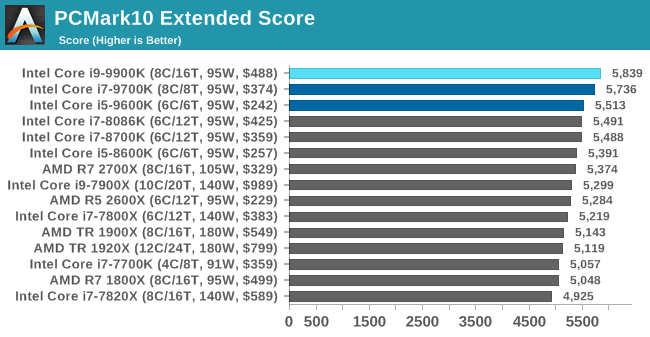
As a general mix of a lot of tests, the new processors from Intel take the top three spots, in order. Even the i5-9600K goes ahead of the i7-8086K.
Chromium Compile: Windows VC++ Compile of Chrome 56
A large number of AnandTech readers are software engineers, looking at how the hardware they use performs. While compiling a Linux kernel is ‘standard’ for the reviewers who often compile, our test is a little more varied – we are using the windows instructions to compile Chrome, specifically a Chrome 56 build from March 2017, as that was when we built the test. Google quite handily gives instructions on how to compile with Windows, along with a 400k file download for the repo.
In our test, using Google’s instructions, we use the MSVC compiler and ninja developer tools to manage the compile. As you may expect, the benchmark is variably threaded, with a mix of DRAM requirements that benefit from faster caches. Data procured in our test is the time taken for the compile, which we convert into compiles per day.
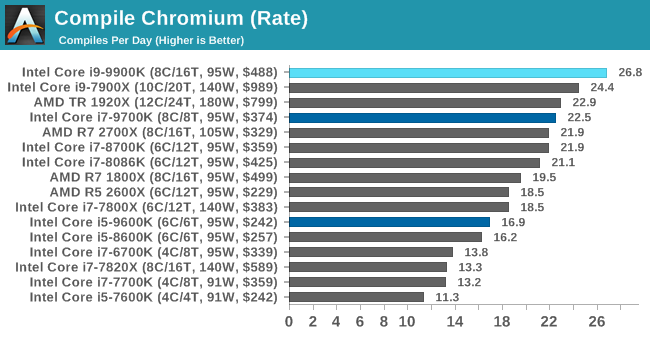
Pushing the raw frequency of the all-core turbo seems to work well in our compile test.
3DMark Physics: In-Game Physics Compute
Alongside PCMark is 3DMark, Futuremark’s (UL’s) gaming test suite. Each gaming tests consists of one or two GPU heavy scenes, along with a physics test that is indicative of when the test was written and the platform it is aimed at. The main overriding tests, in order of complexity, are Ice Storm, Cloud Gate, Sky Diver, Fire Strike, and Time Spy.
Some of the subtests offer variants, such as Ice Storm Unlimited, which is aimed at mobile platforms with an off-screen rendering, or Fire Strike Ultra which is aimed at high-end 4K systems with lots of the added features turned on. Time Spy also currently has an AVX-512 mode (which we may be using in the future).
For our tests, we report in Bench the results from every physics test, but for the sake of the review we keep it to the most demanding of each scene: Ice Storm Unlimited, Cloud Gate, Sky Diver, Fire Strike Ultra, and Time Spy.
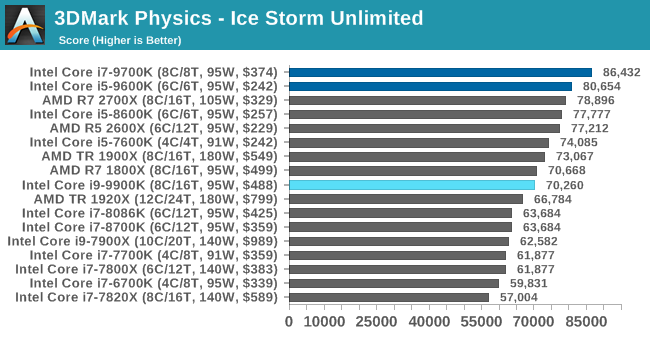
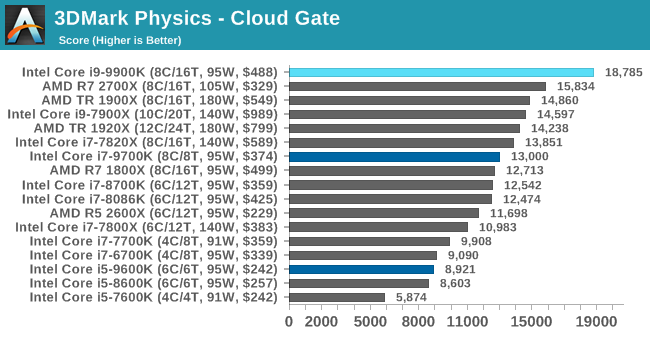
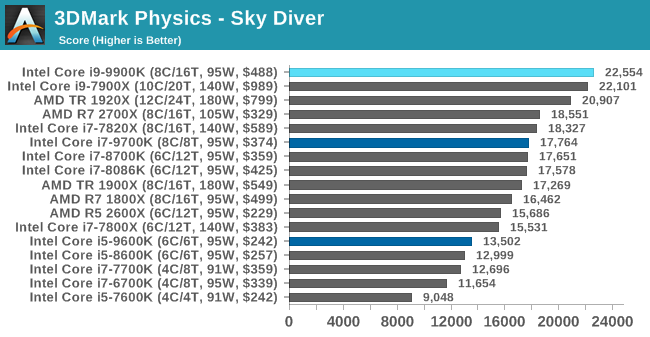
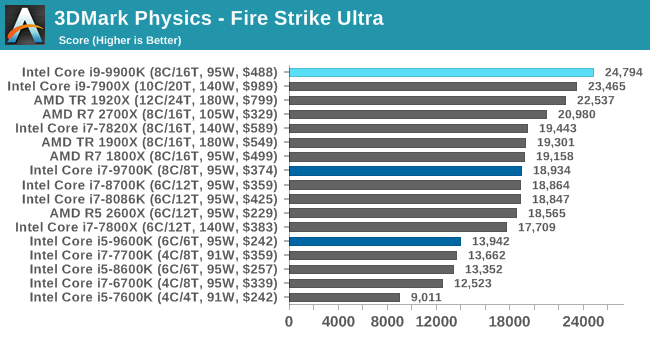
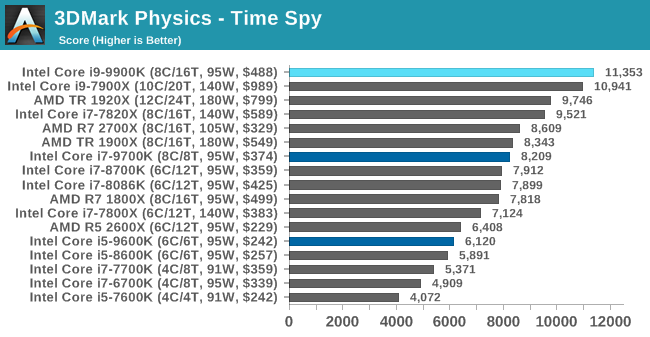
The older Ice Storm test didn't much like the Core i9-9900K, pushing it back behind the R7 1800X. For the more modern tests focused on PCs, the 9900K wins out. The lack of HT is hurting the other two parts.
GeekBench4: Synthetics
A common tool for cross-platform testing between mobile, PC, and Mac, GeekBench 4 is an ultimate exercise in synthetic testing across a range of algorithms looking for peak throughput. Tests include encryption, compression, fast Fourier transform, memory operations, n-body physics, matrix operations, histogram manipulation, and HTML parsing.
I’m including this test due to popular demand, although the results do come across as overly synthetic, and a lot of users often put a lot of weight behind the test due to the fact that it is compiled across different platforms (although with different compilers).
We record the main subtest scores (Crypto, Integer, Floating Point, Memory) in our benchmark database, but for the review we post the overall single and multi-threaded results.
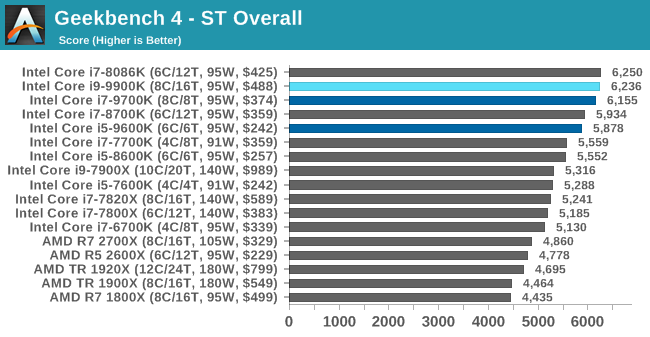
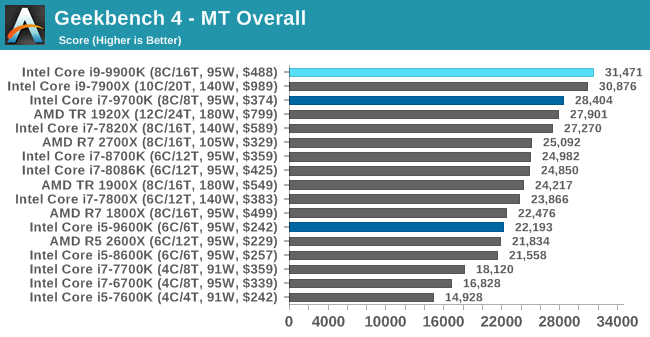










274 Comments
View All Comments
eastcoast_pete - Sunday, October 21, 2018 - link
Yes; unfortunately, that's a major exception, and annoying to somebody like me who'd actually recommend AMD otherwise. I really hope that AMD improves it's AVX/AVX2 implementation and makes it truly 256 bit wide. If I remember correctly, the lag of Ryzen chips in 256 bit AVX vs. Intel is due to AMD using a 2 x 128 bit implementation (workaround, really), which is just nowhere near as fast as real 256 bit AVX. So, I hope that AMD gives their next Ryzen generation full 256 bit AVX, not the 2 x 128 bit workaround.mapesdhs - Sunday, October 21, 2018 - link
It's actually worse than that with pro apps. Even if AMD hugely improved their AVX, it won't help as much as it could so long as apps like Premiere remain so poorly coded. AE even has plugins that are still single-threaded from more than a decade ago. There are also several CAD apps that only use a single core. I once sold a 5GHz 2700K system to an engineering company for use with Majix, it absolutely blew the socks off their far more expensive XEON system (another largely single-threaded app, though not entirely IIRC).Makes me wonder what they're teaching sw engineering students these days; parallel coding and design concepts (hw and sw) was a large part of the comp sci stuff I did 25 years ago. Has it fallen out of favour because there aren't skilled lectures to teach it? Or students don't like tackling the hard stuff? Bot of both? Some of it was certainly difficult to grasp at first, but even back then there was a lot of emphasis on multi-threaded systems, or systems that consisted of multiple separate functional units governed by some kind of management engine (not unlike a modern game I suppose), at the time coding emphasis being on derivatives of C++. It's bizarre that after so long, Premiere inparticular is still so inefficient, ditto AE. One wonders if companies like Adobe simply rely on improving hw trends to provide customers with performance gains, instead of improving the code, though this would fly in the face of their claim a couple of years ago that they would spend a whole year focusing on improving performance since that's what users wanted more than anything else (I remember the survey results being discussed on creativcow).
eastcoast_pete - Sunday, October 21, 2018 - link
Fully agree! Part of the problem is that the re-coding single-thread routines that could really benefit from parallel/multi-thread execution costs the Adobes of this world money, especially if one wants it done right. However, I believe that the biggest reason why so many programs, in full or in part, are solidly stuck in the last century is that their customers simply don't know what they are missing out on. Once volume licensees start asking their software supplier's sales engineers (i.e. sales people) "Yes, nice new interface. But, does this version now fully support multithreaded execution, and, if not, why not?", Adobe and others will give this the priority it should have had all along.repoman27 - Friday, October 19, 2018 - link
USB Type-C ports don't necessarily require a re-timer or re-driver (especially if they’re only using Gen 1 5 Gbit/s signaling), but they do require a USB Type-C Port Controller.The function of that chip is rather different though. Its job is to utilize the CC pins to perform device attach / detach detection, plug orientation detection, establish the initial power and data roles, and advertise available USB Type-C current levels. The port controller also generally includes a high-speed mux to steer the SuperSpeed signals to whichever pins are being used depending on the plug orientation. Referring to a USB Type-C Port Controller as a re-driver is both inaccurate and confusing to readers.
willis936 - Friday, October 19, 2018 - link
Holy damn that's a lot of juice. 220W? That's 60 watts more than a 14x3GHz core IVB E5.They had better top charts with that kind of power draw. I have serious reservations about believing two DDR4 memory channels is enough to feed 8x5GHz cores. I would be interested in a study of memory scaling on this chip specifically, since it's the corner case for the question "Is two memory channels enough in 2018?".
DominionSeraph - Friday, October 19, 2018 - link
This chip would be faster in everything than a 14 core IVB E5, while being over 50% faster in single-threaded tasks.Also, Intel is VERY generous with voltage in turbo. Note the 9700K at stock takes 156W in Blender for a time of 305, but when they dialed it in at 1.025V at 4.6GHz it took 87W for an improved time of 301, and they don't hit the stock wattage until they've hit 5.2GHz. When they get the 9900K scores up I expect that 220W number to be cut nearly in half by a proper voltage setting.
3dGfx - Friday, October 19, 2018 - link
How can you claim 9900k is the best when you never tested the HEDT parts in gaming? Making such claims really makes anandtech look bad. I hope you fix this oversight so skyX can be compared properly to 9900K and the skyX refresh parts!!! -- There was supposed to be a part2 to the i9-7980XE review and it never happened, so gaming benchmarks were never done, and i9-7940X and i9-7920X weren't tested either. HEDT is a gaming platform since it has no ECC support and isn't marketed as a workstation platform. Curious that intel says the 8-core part is now "the best" and you just go along with that without testing their flagship HEDT in games.DannyH246 - Friday, October 19, 2018 - link
If you want an unbiased review go here...https://www.extremetech.com/computing/279165-intel...
Anandtech is a joke. Has been for years. Everyone knows it.
TEAMSWITCHER - Friday, October 19, 2018 - link
Thanks... but no thanks. Why did you even come here? Just to post this? WEAK!Arbie - Friday, October 19, 2018 - link
What a stupid remark. And BTW Extremetech's conclusion is practically the same as AT's. The bias here is yours.